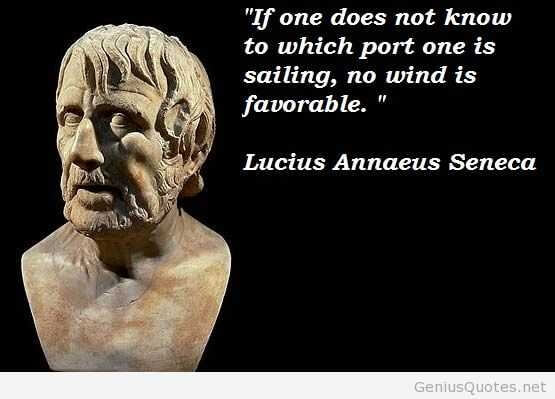
In supporting leaders in gaining clarity of their vision for themselves and their business, I’ve often used the phrase “if you don’t know where you are going, all roads will take you there”. As you can see, though, Seneca spoke of this two thousand years ago!
I am very thankful to Tim Ferris for pointing me towards the Roman Stoics. Last year Tim turned my mind towards a study of stoicism. I am barely scratching the surface, so can’t guide anyone in any informed direction of my own other than to recommend Tim’s thoughts and then perhaps starting, as I did, with his free download of Letters from Seneca.
I’m also thankful for Ryan Holiday. This year I write twice daily in my Daily Stoic journal. Ryan gives a very concise summary of stoicism, one which resonates with me around Frankl and others :
“Stoic philosophy asserts that virtue (such as wisdom) is happiness and judgment be based on behaviour, rather than words. That we don’t control and cannot rely on external events, only ourselves and our responses.
But at the very root of the thinking, there is a very simple, though not easy, way of living. Take obstacles in your life and turn them into your advantage, control what you can and accept what you can’t.
In the words of Epictetus:
“In life our first job is this, to divide and distinguish things into two categories: externals I cannot control, but the choices I make with regard to them I do control. Where will I find good and bad? In me, in my choices.”
Stoicism as a philosophy for living life
Now, “Being Stoic” means more than, as the British would say, “stiff upper lip”, stoicism is a philosophy for how to live.
It can be very powerful for all of us as leaders, but let’s look at Churchill and then a thought leader, Tim Ferris.
I recently watched the tremendous new movie on Churchill, “Darkest Hour”. Very powerful character study of Churchill under extreme pressure and how he coped. It is well known that he suffered from depression, and had episodes of what he called the “Black Dog”.
One short and powerful scene in the movie very subtly showed one such episode, and also a powerful moment where someone came in and reflected to his words to the effect of “it is that you are weak that makes you strong”. To me, this meant that his experience with mental health issues also gave him the ability to be strong for the whole country and in fact the world at a time we all needed him.
Back to Tim Ferris. Tim is bipolar and reflects in a TED talk on this. A few snippets to encourage you to click on the link and watch the TED video:
“Many normal people might have, say, six to 10 major depressive episodes in their lives. I have bipolar depression. It runs in my family. I’ve had 50-plus at this point, and I’ve learned a lot.” {compare that to Churchill !}
Then on stoicism, a comprehensive system for living that can, among other things, be used for: “training yourself to separate what you can control from what you cannot control, and then doing exercises to focus exclusively on the former. This decreases emotional reactivity, which can be a superpower.”
